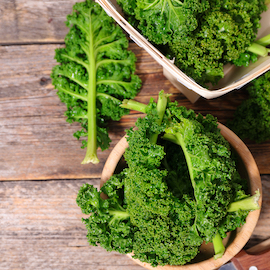 Kale is a leafy green vegetable which is grown for its edible leaves. A member of the cabbage family, the plants have either green or purple leaves with a slightly tough stem running through their middle. The edges of the leaves tend to be either flat or curly. Kale comes either whole or pre-chopped, and it can be eaten raw or cooked. This health-promoting vegetable can be commonly found in most stores the world over.
Kale is a leafy green vegetable which is grown for its edible leaves. A member of the cabbage family, the plants have either green or purple leaves with a slightly tough stem running through their middle. The edges of the leaves tend to be either flat or curly. Kale comes either whole or pre-chopped, and it can be eaten raw or cooked. This health-promoting vegetable can be commonly found in most stores the world over.
Just an 80g serving of raw kale (about 2 handfuls) provides you with one of your 5-a-day.
Nutritional profile
Kale is incredibly nutrient dense. Largely water (around 88%), it packs a lot of your daily needs into its edible leaves. Per 100g, kale contains 3.4g of protein, 1.4g carbohydrate (of which 1.3g is sugar) 2g of fibre, and 1.6g of fat. There are around 33 calories per 100g of kale. A 100g serving also contains 43mg of sodium.
Kale is considered by many nutritionists to be a superfood, as it has a superior vitamin and antioxidant profile. It contains B vitamins such as folate, which is essential for energy and red blood cell formation, and helps to reduce the risk of neural tube defects in pregnancy. Kale also contains vitamin C and E, which are important antioxidants required by the body for a healthy immune system.
But it is kale’s vitamin K content that really brings this leafy green into its own. In 100g of cooked kale there is 419mcg of vitamin K, which is significantly more than your recommended dietary allowance (RDA). Vitamin K is essential for wound healing.
Mineral-wise, it contains a huge proportion of your daily requirements of potassium, calcium, magnesium, and selenium. These minerals provide several benefits including promoting good bone health and brain function.
What is the best way to cook kale?
Some methods of cooking can reduce a food’s nutritional value. As they are water-soluble, the proportion of vitamin C and the various B vitamins in kale can be affected by boiling. Steaming is a more suitable cooking method as it reduces the amount of water this leafy green vegetable comes into contact with. Other ways to retain kale’s goodness are stir-frying and roasting/baking.
Should anyone be careful about eating kale?
The high vitamin K content of kale, whilst it is essential for wound healing, can cause problems if you are taking certain medications. Vitamin K can interact with anti-coagulants (blood thinners) in an adverse way. Research is also ongoing into the potential risks of brassica vegetables to patients with thyroid problems. There is some evidence to suggest that they interfere with the thyroid’s ability to absorb iodine. However, recent research suggests this may not be an issue.
If you are taking anti-coagulants or have a condition which affects the function of your thyroid, it is advisable to speak to your doctor before consuming kale. This does not mean you have to cut this leafy green vegetable out of your diet completely, you may just have to limit your intake.
The lowdown
Kale is an incredibly healthy vegetable stuffed full of essential vitamins and minerals. Adding it into your daily diet will give your body the boost it needs to function properly and this leafy green tastes great too. Just be careful if you are on certain medications — talk to your doctor if you are unsure.